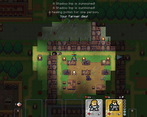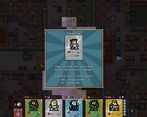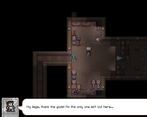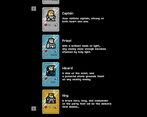Play game
Kingdom Cards's itch.io pageResults
| Criteria | Rank | Score* | Raw Score |
| Scope | #1 | 4.000 | 4.000 |
| Aesthetics | #1 | 4.000 | 4.000 |
| Overall | #7 | 3.667 | 3.667 |
| Innovation | #8 | 3.667 | 3.667 |
| Completeness | #19 | 3.667 | 3.667 |
| Fun | #36 | 3.333 | 3.333 |
| Roguelikeness | #68 | 3.333 | 3.333 |
Ranked from 3 ratings. Score is adjusted from raw score by the median number of ratings per game in the jam.
Judge feedback
Judge feedback is anonymous and shown in a random order.
- This submission demonstrates the value of pre-made resources and engine which let you focus on experimental features while still being able to make a beatiful, polished game during these 7 days. Card mechanics are interesting, but I think that the deck-building aspect of the game is minimal. I kept accepting all the characters I met without dilemmas and that seemed to work, because even a weak card was like additional HP taken from enemy (I bet the game during first play). Would be great if I had to use my brain not only for planning combat with my sequence of cards, but also for creating “my” deck and experimenting with tactics.
- Completeness 4 Hands down felt like a fully-featured game. Likely because you started from the previous year's work, but I definitely forgot I was playing a 7DRL during moments of my playthroughs. Aesthetics 4 The sprites were beautiful, the controls all made sense and that initial transition from castle to over world was certainly mind blowing and something I had never seen before. Really nothing to add here, just a beautiful game Fun 3 After playing this one a few times and failing to win and, despite all the things it does well, I found myself actually dreading subsequent playthroughs because of how functionally tedious card and unit management became. The attrition damage a player takes in this game is significant, and well-warranted, however it encourages using your ranged cards as much as possible for every single enemy which takes more than one hit to defeat (so most all of them). Furthermore since there's no player notification about where and when you might find health potions or additional cards, you feel the once-again tedious need to explore every single house/location and take the least amount of damage possible. The game was certainly worth my time playing, but perhaps due to lack of variety or interesting decisions I found I had to put it down. Innovative 4 Holy cow what a neat take on the nearly-overdone deckbuilding mechanic. Very interesting to have essentially a party-based tactical RPG but only one party member can act at a time. It's a concept that has a ton of potential and was very exciting to have the opportunity to play. Scope 4 Between the art and balance, definitely above and beyond what I have seen in the typical 7drl. Again hard to calibrate expectations without knowing what you started with coming into the 7 days, but a very strong showing nonetheless! Roguelike 3 Definitely plays much like a traditional roguelike, but without any sense of progression beyond collecting and adding cards to your deck it lacks the sort of hero/character development, either though levelling or unique items, that is part of the typical roguelike fare
- Few others could have put together a 7-day-game experience of such refinement than twelve-time 7DRL creator Numeron. Kingdom Cards (v1.0 reviewed) is a straightforward roguelike with excellent production values and a twist: you control a revolving "deck" of characters who are played one at a time from your "hand." Completeness (4/5): Honestly, how much more complete can a game be? Kingdom Cards is "polished, balanced, and practically bug-free," utilizing its tilesets brilliantly. I loved the victory and defeat screens, the elaborately produced procedurally-generated maps, as well as the addition of the "rogue challenge" mode (which was far too challenging for me). But one of the things looked for in a 5/5 for completeness is a game that is "supremely well balanced across multiple playthroughs," and this description has me quibbling to reward that very rare 7DRL jam score. This is because, although Kingdom Cards is an all-around solid game, the v1.0 balance has a certain floatiness to it. This might be inherent to the randomness of the revolving card mechanic, how randomly the enemies and reinforcements are distributed, and how combat lacks much technical feedback to inform the player of resolution with enough precision to make very fine decisions about whether or not one more bump against the enemy is warranted. The floatiness means the player doesn't "click" well enough to feel whether or not the balance is innately rewarding. As for the multiple playthrough consideration, the "rogue challenge" adds exactly one additional playthrough. Other than that, once you have beaten the demon there is little need to do it again. Aesthetics (4/5): Graphically, Kingdom Cards' utilizes its assets magnificently. The tiles were animated well, and I was very impressed with the seamless overmap transitions, the level of detail in the procedural generation of the village, city, and dungeon, the minutiae of the roads and paths, and so on - it was all so good I had to go back and make sure it was not simply hand-crafted. I enjoyed how defeated enemies will convey a sense of being knocked back with an angled blood splotch on the ground. The screen shakes when hits are exchanged, and at times the environment takes damage from the ferocity of their blows (such as carpets getting messed up beneath combatants' feet). The aesthetics rating also takes the functionality of communicating gameplay concepts in mind. I mentioned issues "feeling" the balance, as the health bars and numbers on the cards were the players' main feedback as to how combat went or would go, and they performed a serviceable job. The special effects of things like wizard spells and projectiles were well-executed, but not particularly over-the-top. There's no sound or music, but that's not required or expected. If there's any particular quibble I have about the aesthetics, it's that it's a little too minimalist and streamlined. Roguelike fans are often not intimidated by statistics, but rather quite interested in seeing more of them in order to understand the game systems. Though overwhelmingly elegant, the casual-friendly approach to Kingdom Cards' UI obscures some vital details from a player base with a strong tendency to be hungry for more information. Fun (4/5): Without a doubt, I would have missed out if I did not play this game. The excellent aesthetics support a suitably involving core combat mechanic. The brilliance of Kingdom Cards' card-draw mechanic is that it prevents the player from getting stuck in a rut of an existing playstyle because the player cannot accurately predict just what moves are going to be available for them until they are drawn. This is enriched by how the cards have health bars this time around, necessitating healing them, reserving them for later, or sacrificing them, and the random draw may not always give you a choice. The overall result forces the player to think on their feet, there's no autopilot in Kingdom Cards, and I truly respect an involving game. That said, the v1.0 I played had some minor details undermining the finer details of the mechanics. The overall "floatiness" I mentioned earlier is the foremost of them. Look at it this way: with Slay The Spire, everything is on the table before I play the next card, I know exactly what's going to happen so I can plan more accurately. Adding a bit of randomness to that can, in some circumstances, make things a bit more exciting but here it complicates things unnecessarily because the randomness of the card draw gets compounded with the minor randomness of damage resolution. It's unclear how much health the enemies have without a lot of play experience, and even then it's sometimes hard to determine with a mere health bar when the enemy's health is halfway depleted or *almost* halfway completed. The simplicity of the cards is also a little self-limiting in just what I could do with them, and my tactics were often flummoxed by having an active fatigue counter or too little time units left to leverage my unit, as though two counterbalances to abilities were in conflict. If these issues were ironed out, the card draw twist to the roguelike formula could prove to be stronger than it felt here. Innovation (4/5): Innovation is an inherently difficult thing to gauge when it comes to any field, including games. I am skewing above average in the case of Kingdom Cards because (obviously) the card draw mechanic is definitely bringing something fundamentally new (and core to the experience) of a roguelike game. But, to garner the quite-rare 5/5 in innovation, I think we would probably need something stronger than a collectible card mechanic implemented into the core roguelike game loop as a substitute for units. There is even a Wikipedia entry for "Roguelike deck-building games" which no doubt annoys the roguelike fundamentalists. Kingdom Cards is definitely more like Rogue than the average example of what Wikipedia contributors think a roguelike deck-builder is, but the idea is more novel than new at this point, but still more innovative than the average 7DRL jam entry. Scope (4/5): The 7DRL judges' definition of a "4/5" in scope is, "beyond what you think could be done in seven days, with extensive features or very heavy on content." Kingdom Cards is most certainly that. In fact, I am pretty sure I have seen some preliminary work on Kingdom Cards' discussed on roguelikedev that is well outside the 7-day window, but I believe that this is permitted as an offshoot of an existing project in much the same way Polybot-7 was created using much of Cogmind's resources. In any case, when judging the scope of completion of Kingdom Cards we certainly have an above-average level of content and refinement here. If it were a bit deeper and had more longevity to it, I would consider it an outlier for an even higher score. Roguelikeness (3/5): One of the least fair parts about being a 7DRL jam judge is to judge a game based on the feature set of Rogue and its derivatives. It's like judging the Mona Lisa for not being enough like The Scream: its lacking resemblance does not make the Mona Lisa any less a masterpiece, but it does impair its score for a 7-Day The Scream painting event. Kingdom Cards is turn-based, tile-based, has (incredibly well done) procedural maps, bumping to attack, random enemy placement, and (in lieu of any item other than health potions) random unit location. In terms of the average entry of this jam, Kingdom Cards' has about as much in common with Rogue as they do. However, the card draw mechanic detracts from its roguelikeness somewhat, and I suppose it goes to show that if one were to get both a high innovation and roguelikeness score it would be necessary to innovate in a very specific vein of Rogue enhancement. However, there are a number of additional major Rogue game mechanics omitted such as character progression, hunger clocks, inventory management, and so on. Just a few more of those features would have been enough for me to say it was above-average in Rogue likeness. Overall: Kingdom Cards is pretty great. You're quite good. I have seen worse games made professionally that performed well among their audience. I'd score it higher but, as you might have gathered, 5/5's are quite rare in the 7DRL event.
Successful or Incomplete?
Success
Did development of the game take place during the 7DRL Challenge week. (If not, please don't submit your game)
Yes
Is your game a roguelike or a roguelite? (If not, please don't submit your game)
Roguelike








Leave a comment
Log in with itch.io to leave a comment.